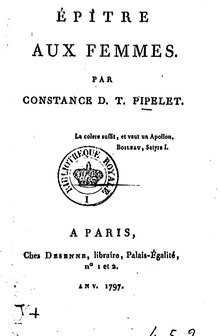Constance zu Salm-Reifferscheidt-Dyck
Constance Marie zu Salm-Reifferscheidt-Dyck (* as Constance de Théis on September 7, 1767 in Nantes , † April 13, 1845 in Paris ) was a French poet and writer . During her first marriage (1789-1802) she was called Constance de Pipelet , in her second marriage from 1803 Countess , from 1816 Princess zu Salm-Reifferscheidt-Dyck .
Life
As the daughter of a middle-class family from Picardy , Constance received an excellent upbringing. At the age of 18 she published her first romantic poem Le bouton de rose in the Almanach des Muses , the model of the German muse almanac . In 1789 she married the wealthy surgeon Pipelet de Leury from Nancy and moved with him to Paris .
After her wedding, she was the first woman in France to attend a lyceum . In 1794 she wrote the libretto for the successful opera Sapho by Jean-Paul-Égide Martini . Convinced of the ideas of the French Revolution , she was committed to equality, including when it came to women's rights. During this time she published the Épître aux femmes (letter to women) in 1797 and the Épîtres à Sophie (letters to Sophie) in 1801 .
In 1802, their marriage was dissolved with Pipelet de Leury and the following year married Constance also divorced six years younger Count Joseph zu Salm-Dyck Reifferscheidt which in 1816 by Friedrich Wilhelm III. was raised by Prussia to the rank of prince. After her marriage she stayed at Schloss Dyck for a large part of the year . Here too she ran an open house. Dyck, which was then located in the newly established Rur department , was gladly visited by the French notables. The then prefect of the department reports on his visit: "Countess Constance entertained us with fire and charming verses about the inconveniences of country life [...] The only sorrow one experiences in Dyck is to leave the people there." Napoleon is said to have visited her there. Constance zu Salm-Reifferscheidt-Dyck spent most of the winters in Paris.
In addition to her writing activities, she ran a literary salon through which u. a. Stendhal reports in his autobiography. Marie-Joseph Chénier gave her the nickname the muse of reason . Here she received, among others, Alexandre Dumas , Alexander von Humboldt and Girodet . As a result, she published u. a. several volumes of poetry (1811, 1814), the novel Vingt-quatre heures de la vie d'une femme sensible (1824) and Pensée's philosophical reflections (1829), which first appeared in Aachen and were translated into German in 1838.
While her work was constantly discussed and reissued in France , the German-French pioneer for women's and human rights has only recently been remembered. Your novel 24 hours in the life of a sensitive woman has found its way into German feature pages. Constance zu Salm-Reifferscheidt-Dyck died on April 13, 1845 and was buried in the Père Lachaise cemetery in Paris.
Works
In French
- Sapho , opera libretto, music by Jean-Paul-Égide Martini, Paris, Théâtre Louvois , December 14, 1794.
- Épître aux femmes , 1797.
- Rapport sur les fleurs de la artificielles citoyennes Roux-Montagnac , 1798th
- Camille, ou Amitié et imprudence , verse drama in 5 acts, Théâtre Français , Paris 1800.
- Report sur un ouvrage du Citoyen Théremin, intitulé: De la condition des femmes dans une république , 1800.
- Épître à un jeune auteur sur l'indépendance et les devoirs de l'homme de lettres , 1806.
- Précis de la vie de Sapho , 1810.
- Poésies , 1811.
- Poésies , 1814.
- Vingt-quatre heures de la vie d'une femme sensible . Roman, 1824. New edition: Editions Phébus 2007. ISBN 2-7529-0248-4 .
- Poésies , 1825, 2 vols.
- Fragment d'un ouvrage sur l'Allemagne , 1826.
- Pensées , Aix-la-Chapelle, 1829 edition. 1846
- Mes Soixante ans , Paris, Didot, 1833.
- Oeuvres , Paris, Didot, 1835.
- Œuvres complètes , Paris, 1842, 4 vols.
Translated into German
- Thoughts of the Princess Constantia of Salm. From the French. Schreiber, Düsseldorf 1838 ( digitized version ).
- 24 hours in the life of a sensitive woman. Translated from the French by Claudia Steinitz. Afterword by Karl-Heinz Ott. Hoffmann and Campe, Hamburg 2008, ISBN 978-3-455-40093-9 .
literature
- Karl-Heinz Ott : Countess von Salm-Dyck and the time of the epistolary novels . In: Constanze de Salm: 24 hours in the life of a sensitive woman. Hoffmann and Campe, Hamburg 2008, ISBN 978-3-455-40093-9 .
Web links
- Article in Damen Conversations Lexikon from 1837
- Literature by and about Constance zu Salm-Reifferscheidt-Dyck in the catalog of the German National Library
- Development project http://constance-de-salm.de/
Individual evidence
- ↑ Published in 1785 in the Almanach des Grâces .
- ↑ Ernst Wunschmann: Salm-Reifferscheid, Joseph Fürst and Altgraf zu . In: Allgemeine Deutsche Biographie (ADB). Volume 30, Duncker & Humblot, Leipzig 1890, pp. 255-257.
- ^ Jean Charles François Baron de Ladoucette: Journey in 1813 and 1814 through the country between the Meuse and the Rhine . Ed .: Birgit Gerlach. Antiquariat Am St. Vith, Mönchengladbach 2009, ISBN 978-3-00-028810-4 , p. 159 .
- ^ Article in the online edition of the NGZ from September 12, 2001
- ^ La Vie de Henri Brulard, 1890
- ↑ http://www.dradio.de/dkultur/sendung/kritik/800367/
| personal data | |
|---|---|
| SURNAME | Salm-Reifferscheidt-Dyck, Constance zu |
| ALTERNATIVE NAMES | Théis, Constance de; Pipelet de Leury, Constance Marie de |
| BRIEF DESCRIPTION | French poet and writer |
| DATE OF BIRTH | September 7, 1767 |
| PLACE OF BIRTH | Nantes |
| DATE OF DEATH | April 13, 1845 |
| Place of death | Paris |



